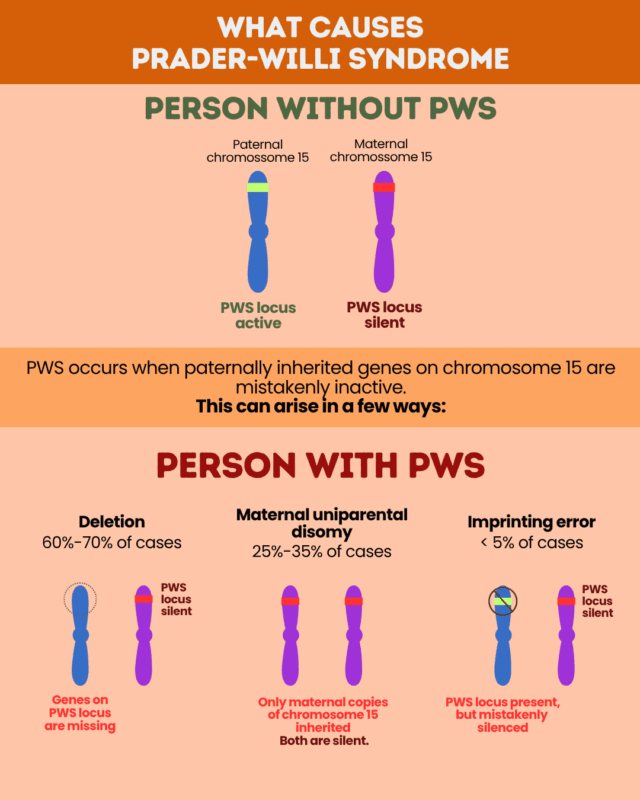Causes of Prader-Willi syndrome
Last updated Sept. 19, 2025, by Lindsey Shapiro, PhD

Prader-Willi syndrome (PWS) causes are genetic in nature, and are characterized by a loss of function of genes located on a certain section of chromosome 15 called the PWS locus. These genes control a wide range of bodily functions, and their loss leads to hallmark PWS symptoms such as excessive hunger, poor growth, intellectual disability, and behavioral problems.
What causes Prader-Willi syndrome?
PWS is a genetic disorder caused by abnormalities that affect the function of genes in the paternal PWS locus.
Chromosomes — the threadlike structures in cells containing DNA and genes — exist in pairs, with one chromosome copy inherited from a person’s mother and the other from the father.
Cells often use gene copies from both parents to work correctly, but sometimes only one copy is turned on. In such cases, the body has a natural process, called genomic imprinting, to turn off the copy it doesn’t need. Normally, genomic imprinting silences genes on the maternally inherited PWS locus, and the genes inherited from the father are active.
Prader-Willi syndrome occurs when the paternal PWS locus genes are not active like they should be, though the maternally inherited genes are silenced as usual. This can happen in a few ways:
- Chromosome 15 deletion: PWS locus genes on the paternal chromosome 15 are missing or deleted. This is the most common cause of PWS, accounting for about 60% to 70% of cases.
- Maternal uniparental disomy (UPD): A child inherits two copies of chromosome 15 from the mother and none from the father. About 25%-35% of patients have this genetic abnormality.
- Imprinting defect: A genetic mutation in a region known as the imprinting center of the paternal chromosome 15 causes genes of the PWS locus to be mistakenly silenced. This occurs in fewer than 5% of cases.
- Translocations: A piece of chromosome 15 breaks off and attaches to another chromosome, affecting the activity of paternal PWS locus genes. This is an extremely uncommon cause of PWS.
Regardless of the specific genetic defect, the loss of function of paternal PWS locus genes is thought to, in part, disrupt the development and function of the hypothalamus, a brain region involved in regulating hunger and other bodily functions.
Beyond these genetic abnormalities, there are no other known causes of PWS. That’s why genetic testing is the most definitive way to reach a PWS diagnosis. Research is focused on developing PWS treatment strategies that address its underlying genetic cause.

Prader-Willi syndrome risk factors
Genetic errors on chromosome 15 are the main PWS risk factors. It is not exactly known why they occur, but most of these errors are thought to happen randomly around the time of conception or during early fetal development. As such, there is no established PWS inheritance pattern, and the disease rarely runs in families.
Older maternal age at pregnancy has been associated with an increased risk of the UPD disease subtype, but not paternal chromosome deletion. While studies have evaluated other possible lifestyle or environmental factors that could increase the risk of PWS, none have been definitively established.
Prade-Willi Syndrome News is strictly a news and information website about the disease. It does not provide medical advice, diagnosis, or treatment. This content is not intended to be a substitute for professional medical advice, diagnosis, or treatment. Always seek the advice of your physician or other qualified health provider with any questions you may have regarding a medical condition. Never disregard professional medical advice or delay in seeking it because of something you have read on this website.
Recent Posts
- Adults with PWS need lifelong support in daily activities, study finds
- Celebrating a milestone in life with Prader-Willi syndrome
- New technique ‘wakes up’ silent genes in Prader-Willi in lab testing
- Probiotics may boost beneficial gut bacteria in Prader-Willi syndrome
- Avoiding meltdowns during the holidays with Prader-Willi syndrome
- PWS patients see weight loss, less hunger with setmelanotide in trial
- Eye-tracking test adapted to better measure hunger behaviors in PWS
- We struggled to find mental health support for our son with PWS
- How Prader-Willi families can enjoy the holiday season
- Diabetes medications may support kidney health in adults with PWS